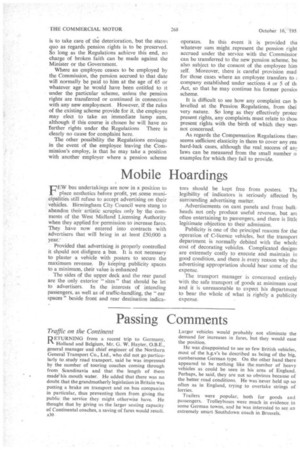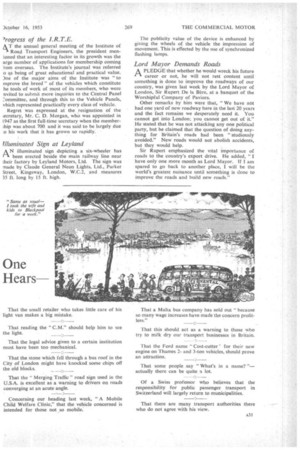Passing Comments
Page 32

Page 33

If you've noticed an error in this article please click here to report it so we can fix it.
Traffic on the Continent
RETURNING from a recent trip to Germany, Holland and Belgium, Mr. G. W. Hayter, 0.B.E., general manager and chief engineer of the Northern General Transport Co., Ltd., who did not go particularly to.study road transport, said he was impressed by the number of touring coaches coming through from Scandinavia and that the length of them made" his mouth water. He added that there was no doubt that the grandmotherly legislation in Britain was putting a brake on transport and on bus companies in particular, thus preventing them from giving the public the service they might otherwise have. He thought that by giving us the larger seating capacity of Continental coaches, a saving of fares would result. A30
Larger vehicles would probably not eliminate the demand for increases in fares, but they would ease the position.
He was disappointed to see so few British vehicles, most of the h.g.v's he described as being of the big, cumbersome German type. On the other hand there appeared to be nothing like the number of heavy vehicles as could be seen in his area of England. Perhaps, he said, they are not so obvious because of the better road conditions. He was -never held up so often as in England, trying to overtake strings of lorries.
Trailers were popular, both for goods and passengers. Trolleybuses were much in evidence in some German towns, and he was interested to see an extremely smart Southdown coach in Brussels.
Progress of the I.R.T.E.
A T the annual general meeting of the Institute of
Road Transport Engineers, the president menioned that an interesting factor in its growth was the arge number of applications for membership coming rem overseas. The Institute's journal was referred o as being of great educational and practical value. 3ne of the major aims of the Institute was "to mprove the breed" of the vehicles which constitute he tools of work of most of its members, who were nvited to submit more inquiries to the Central Panel 2ommittee, and through this to the Vehicle Panels, which represented practically every class of vehicle.
Regret was expressed at the .resignation of the ecretary, Mr. C. D. Morgan, who was appointed in 1947 as the first full-time Secretary when the member;hip was about 700 and it was said to be largely due .o his work that it has grown so rapidly.
fl/urn/noted Sign at Leyland
AN illuminated sign depicting a six-wheeler has been erected beside the main railway line near their factory by Leyland Motors, Ltd. The sign was made by Claude General Neon Lights, Ltd., Parker Street, Kingsway, London, W.C.2, and measures 35 ft. long by 15 ft. high.
The publicity value of the device is enhanced by giving the wheels of the vehicle the impression of movement. This is effected by the use of synchronized flashing lamps.
Lord Mayor Demands Roads
APLEDGE that whether he would wreck his future
career or not, he will not rest content until something is done to improve the roadways of our country, was given last week by the Lord Mayor of London, Sir Rupert De la Bere, at a banquet of the Worshipful Company of Paviors.
Other remarks by him were that, "We have not had one yard of new roadway here in the last 20 years and the fact remains we desperately need it. You cannot get into London; you cannot get out of it." He stated that he was not attacking any one political party, but he claimed that the question of doing anything for Britain's roads had been "studiously avoided." New roads would not abolish accidents, but they would help.
Sir Rupert emphasized the vital importance of roads to the country's export drive. He added, "I have only one more month as Lord Mayor. If I am spared to go back to another place, I will be the world's greatest nuisance until something is done to improve the roads and build new roads."




























































































